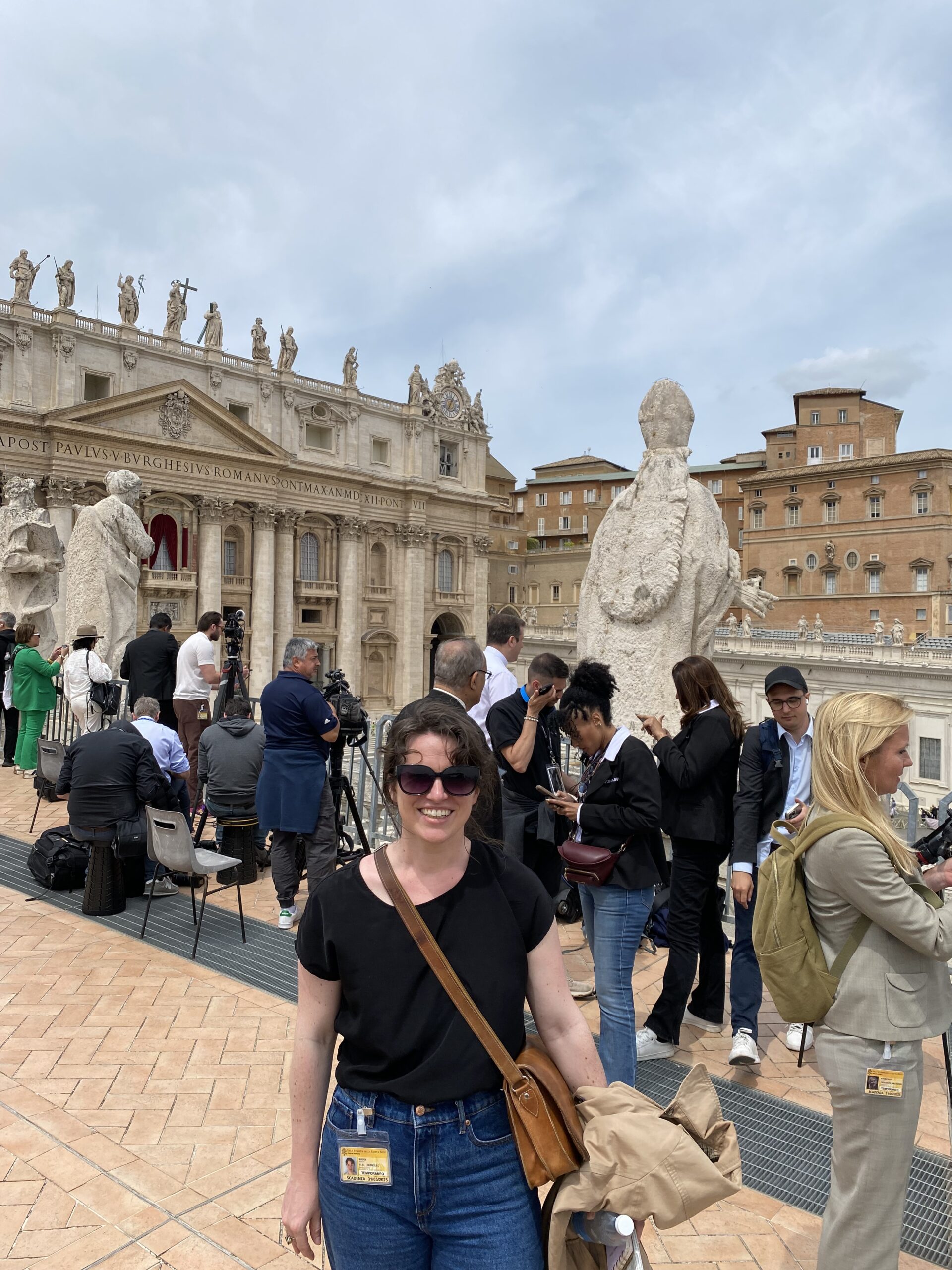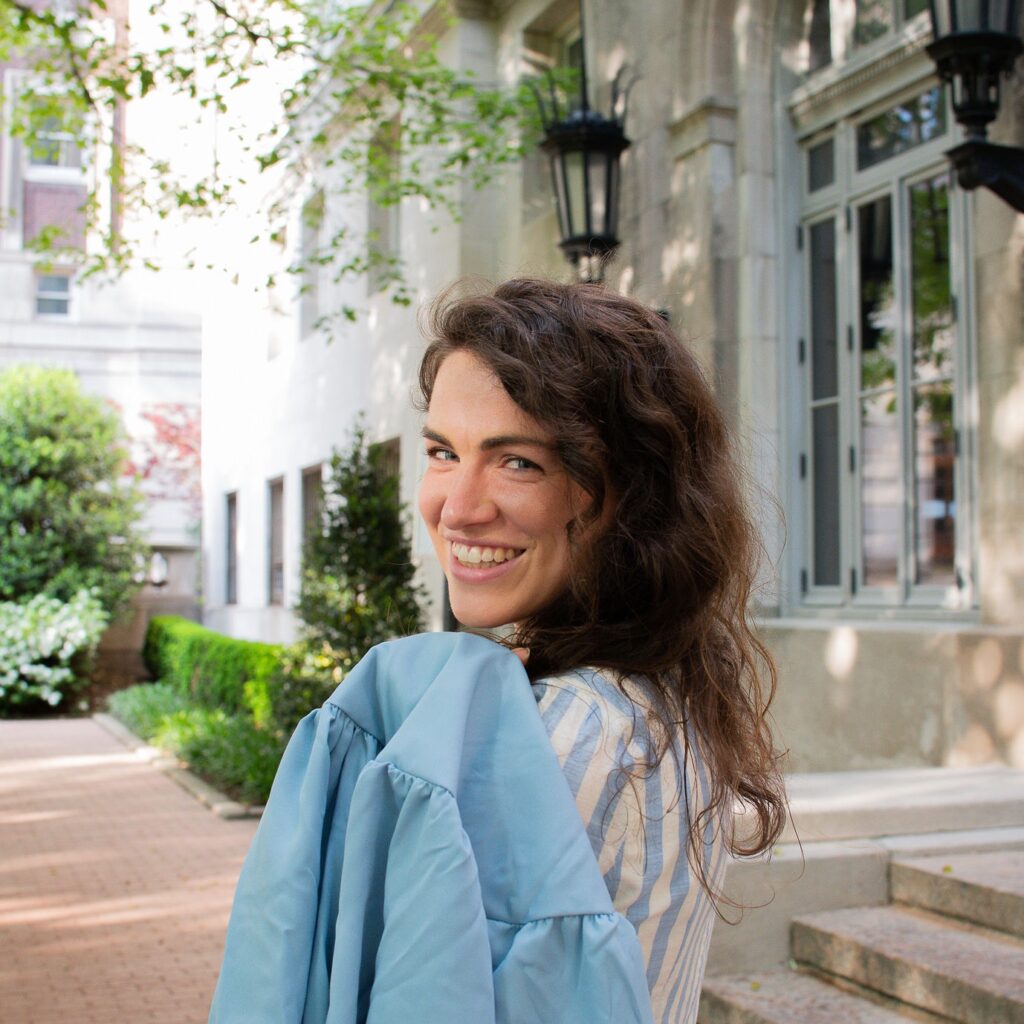A Paschal Event: Seeing the Wounds on His Glorified Body

The day after Pope Leo XIV’s election, I was in a funk.
After the rush of excitement the previous evening, staying up until 4 am the night of the new pope’s election to file stories, I was feeling a kind of ecclesial hangover.
In his address to the College of Cardinals the next day, Pope Leo XIV proposed that we contemplate the mystery of Pope Francis’ death and the ensuing conclave as paschal events “providentially bathed in the light of Easter.”
Standing in the square of St. Peter’s on May 8 felt like Pentecost: many languages, a rushing wind, hearts aflame. I wonder if any journalist covering the proceedings did hold their breath or feel their heartbeat accelerate a bit when the crowd erupted into cheers of “Viva il Papa!” and the bells tolled. As I wrote elsewhere, the movement of the Spirit, the presence of thousands of voices reaching out to God, feels like a palpable, physical force.
Pope Leo XIV greeted us from the balcony of St. Peter’s with the same words—peace be with you—with which Christ greets the disciples hiding in the locked upper room (John 20:19). Immediately after, Christ shows them the wounds in his hands and side (John 20:20). Only then, the Fourth Gospel writer says, after seeing Christ’s Easter Body, marked by the wounds of his abuse, do the disciples rejoice.
My life in the Church—even the joyful moments like watching the white smoke signal a new pope—have been marked by my own wounds from abuse.
On the rainy night of March 13, 2013, I had been in St. Peter’s Square, watching Cardinal Jorge Mario Bergoglio step out onto the balcony and become Pope Francis. The priest who had abused me was also there in the square, within the crowd pressed around me.
Twelve years later, the wounds linger. In the rush of excitement, watching Cardinal Robert Francis Prevost become Pope Leo XIV, interviewing, recording, rejoicing, mourning Francis, filing stories, I could almost ignore them. But, on Friday the wounds felt raw again, their bitterness tainting the sunshine of that bright Rome day. But Leo’s words invited me to consider my wounds, like those on Christ’s Body, as part of the mystery of this paschal event.
Romano Guardini, in his 1933 book The Meaning of the Church, wrote:
Christ lives on in the Church, but Christ crucified. One might almost venture to suggest that the defects of the Church are His cross. The entire Being of the mystical Christ—His truth, His holiness, His grace, and His adorable person—are nailed to them, as once His physical body to the wood of the Cross. And he who will have Christ must take His cross as well. We cannot separate Him from it.
Guardini continued on to say that “imperfection belongs to the very essence of the Church on earth.” Because the Church exists in history its incompleteness, imperfections, and failings are part of its historical reality. The work of “remov[ing] her imperfections” is the work of the entire pilgrim church, as long as, Guardini said, “we have the courage to endure a state of permanent Dissatisfaction.”
Gerard McGlone, SJ, a research fellow at Georgetown University studying clerical abuse, has spoken to me and other journalists about the need for the church to embrace a victim-centric approach to clerical sex abuse cases, rather than a “perpetrator-centric” approach.
I remember one of the first priests I spoke to about my experience of abuse said to me: Thank God you didn’t lose your faith. And I remember those words immediately struck me as odd. Why would I leave my faith? Wouldn’t the man abusing other people be the one in danger of losing his faith? Why would the Mystical Body of Christ be more comfortable for a perpetrator of abuse to belong to rather than a victim of it?
The unsubtle message sent to me—and many other victim-survivors—when seeking healing and justice was: “This is something that we don’t want to have to deal with. This is your problem, not the Church’s. We are the Church, you are not.” Even that priest’s attempted act of affirmation and consolation centered the perpetrator as a representative of the church. I begin to understand why Christ told the doubting apostle to put a finger in his blood-soaked side: Feel this. Don’t ignore it. Believe.
I have many friends who no longer participate in liturgy—the work of the people, the work they are needed for—because of their wounds, wounds that church communities and liturgies can often refract rather than heal.
Although I still show up at Mass each day, I, too, have grown more hesitant to engage, my desire to participate weakened. I am more aware as I grow older and priests grow younger, of how much these men can wound and re-wound—so often without meaning to. Perhaps I have grown just as transactional as all the consumer Christians liturgists warn against: just give me the sacrament and I’ll get out of here, I think. This is the sort of breakdown in relationship that happens in marriages, in communities—in a church—where we no longer listen or are listened to, where we do not hear each other’s wounds.
The Final Document of the Synod emphasizes the necessity of the Church listening to survivors of abuse and asking for forgiveness in order to be able to live its mission to preach the good news:
“The Church needs to listen with special attention and sensitivity to the voices of victims and survivors of sexual, spiritual, economic, power and conscience abuse by members of the clergy or persons with Church appointments,” paragraph 55 says. “Listening is a fundamental element of the path to healing, repentance, justice and reconciliation.”
In a talk with the Augustinian parish of St. Jude in New Lenox, Illinois last August, then-Cardinal Prevost spoke about handling sexual abuse cases as bishop in Chiclayo, Peru, and he mentioned respecting the victim’s needs “first and foremost.” Abuse survivors in Peru have said to the Associated Press that, as bishop, he listened to them and advocated for them in a particularly difficult case. “The church is not father up here [on the altar] on Sunday with a lot of spectators,” then-Cardinal Prevost said at the talk at St. Jude. Rather, he said: “we’re all called to be a part of this church.” Perhaps, I thought, he means it.
Since his election, Pope Leo XIV has continued to call the church, since that very first night, to be a synodal church, a church that listens, that builds bridges, walks together, a church of all the baptized, united in our common vocation of discipleship. His words sound like the words of a person who listens to Christ’s wounds.
It is with wounds like mine—like those of many men and women wounded by Christ’s shepherds—that Christ enters the room of frightened men. The frightened men recognize the God they abandoned and betrayed through an encounter with his wounds. That is the paschal event, the experience of Resurrection: we have seen the wounds on his glorified body; we can never be the same again.

Renée Roden is a freelance journalist and the author of Tantur: Seeking Christian Unity in a Divided City, due out in October 2025 with Liturgical Press. She lives at St. Martin de Porres Catholic Worker in Harrisburg. Follow her on substack


